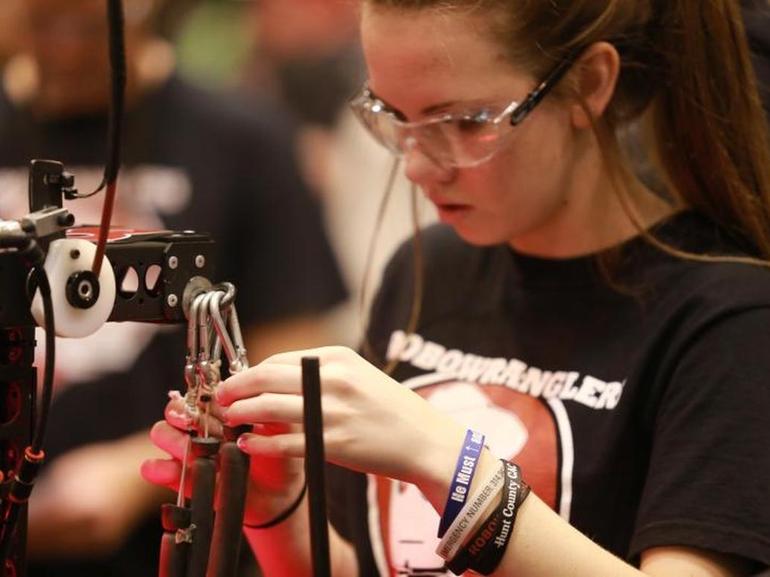
The debate over what will happen to human jobs in the age of the robot is heating up, with many worrying about the impact of robots on factory jobs, and others making the case that new tasks will be created. Either way, automation is shaking up manufacturing—and the only thing clear is that the kinds of jobs needed for future success are changing.
But there is, however, one job certain to be in-demand in the age of automation: Robot programmers.
Ankur Gopal, the CEO of Interapt, a tech startup in Louisville, KY, sees a growing demand for people who are skilled in this area. In fact, he is looking into training people in this field right now. "We are talking to some robot manufacturers and executives at companies who would hire them," said Gopal. "It's being very well-received in the planning stage."
So what does a robot programmer do? It is a decidedly different skill from computer programming, Joe Jones, founder of Harvest Automation (and original Roomba inventor), argued in his book Robot Programming: A Practical Guide to Behavior-Based Robotics. It is also particularly relevant at a time when co-bots (collaborative robots) are gaining popularity, working side-by-side with human workers.
Jones makes the case that robot programming requires real-world training.
"The hard part of robot programming isn't writing the basic code that makes the robot work," Jones told TechRepublic. "Rather, it's observing what the robot actually does when it executes that code, figuring out why it doesn't behave the way you expected, and then changing things to make it work better—or maybe at all. After a large number of iterations, the structure of the code may be quite similar to what you started with but the details are usually very different."
For example, Jones said, when the original Roomba was created, a man named Phil Mass did all of its programming—with no prior experience.
Mass had been interested in robotics in college, and had learned about an approach that he told TechRepublic "tried to mimic nature and build up complex robot behavior from simpler layers of reactions to the robot's environment." Instead of a top-down approach, said Mass, this was bottom-up. "I was very excited when I landed a job at iRobot and could put some of that theory to the test," he said.
When Mass began working on the Roomba, he said, it was just a side project. "I got to design a system of behaviors for the Roomba that would allow it to drive around unstructured environments and get the floor clean," he said. "At the start of the project, we had no idea how hazardous a normal home is when you're only a couple of inches tall and have a tiny 8-bit brain."
In robotics, Mass said, things happen in real-time, and "you need to react to sensors and data very quickly."
SEE: How will AI impact jobs? High-powered panel tackles the big question
If your business is interested in bringing robotic programmers in, Mass said it's important to integrate them with other engineers. "Don't isolate them," he said. "From my experience, some problems in robotics can only be solved by a clever combination of software, electronics and mechanical design. Sometimes, changing the surface or angle around a sensor can make all the difference to making it work reliably. Make sure all of your engineers are working closely together and are talking to each other about their problems. Sometimes a solution can come from an unexpected direction."
How to go about training to be a robot programmer? There are many books that teach programming, and you can also get your hands on a robotics kit. Also, Mass said "you shouldn't be afraid of reading data sheets or using an oscilloscope."
Jones said he believes that practice is key. "Subtlety and great complexity characterize the interaction between robots and the real world," he said. "Mastering the programming that connects the two requires hands-on experience."
To get started, Mass recommends an undergraduate degree in computer science or robotics. "But given that my education is in physics and sculpture," he said, "I'd never say that was the only way to go."
Also see...
- 6 ways the robot revolution will transform the future of work (TechRepublic)
- How AI and automation could hollow out the US job market (TechRepublic)
- Why China is scooping up robots from Rethink Robotics to solve its manufacturing problem (TechRepublic)
- When robots eliminate jobs, humans will find better things to do (ZDNet)
- Why it's time to prepare for a world where machines can do your job (ZDNet)
Disclosure
Hope Reese has nothing to disclose. She doesn't hold investments in the technology companies she covers.
Full Bio
Hope Reese is a Staff Writer for TechRepublic. She covers the intersection of technology and society, examining the people and ideas that transform how we live today.










